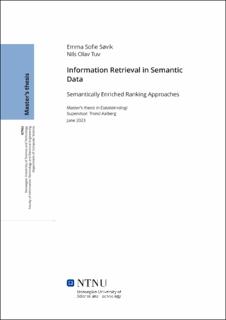| dc.contributor.advisor | Aalberg, Trond | |
| dc.contributor.author | Søvik, Emma Sofie | |
| dc.contributor.author | Tuv, Nils Olav | |
| dc.date.accessioned | 2023-10-19T17:20:20Z | |
| dc.date.available | 2023-10-19T17:20:20Z | |
| dc.date.issued | 2023 | |
| dc.identifier | no.ntnu:inspera:142737689:34449854 | |
| dc.identifier.uri | https://hdl.handle.net/11250/3097660 | |
| dc.description.abstract | Mengden semantisk data tilgjengelig har økt betraktelig de siste årene. Semantisk data tilbyr mange fordeler i informasjonsgjenfinning, men tradisjonelle informasjonsgenfinningsmetoder greier ikke utnytte informasjonen i denne strukturerte dataen. Derfor er det behov for nye teknikker som utnytter semantikken i slik data. Tidligere forskning har introdusert nye teknikker kalt semantically enriched ranking. Disse teknikkene kan bli kombinert med tradisjonelle informasjonsgjenfinningsmetoder og er ment å forbedre rangeringen. Denne oppgaven implementerer og undersøker noen av disse teknikkene for å se om de kan hjelpe informasjonsgjenfinnings systemer til å prestere bedre for semantisk data.
Denne oppgaven tar for seg fire forskjellige teknikker for å forbedre tradisjonell informasjonsgjenfinning. Dette inkluderer target entity, Tonon's hybrid ranking, entity linking, og sentralitet. Disse teknikkene ble deretter implementert sammen med et søkesystem. Flere ulike spørringer med forskjellige informasjonsbehov ble brukt for å evaluere de ulike teknikkene, før resultatet ble analysert og sammenlignet opp mot resultatene fra tradisjonell informasjonsgjenfinning.
Resultatene fra forskjellige evalueringsmetoder, samt observasjon, tilsier at alle fire teknikker har positive egenskaper. Siden teknikkene bruker semantikken i dataen på ulike måter, gir teknikkene forskjellige resultater for de ulike spørringene. Derfor ble det konkludert at en kombinasjon av teknikkene er å foretrekke for å kunne optimalisere søkesystemer for semantisk data. Disse funnene er et skritt i riktig retning i arbeidet med å finne metoder som gjør at semantiske informasjonsgjenfinningssystemer kan utnytte informasjonen i semantisk data. | |
| dc.description.abstract | The amount of semantic data available has grown rapidly over the years. Semantic data offers numerous advantages in information retrieval, however, traditional information retrieval technologies have shortcomings when utilizing the information in this structured data. Therefore, new techniques that leverage the semantics of the data are needed. To address this, previous research has introduced new techniques known as semantically enriched rankings. These techniques can be combined with traditional information retrieval systems and are meant to improve the ranking further. This thesis aimed to implement and investigate some of these enrichments, to see if they could help information retrieval systems perform better for semantic data.
The thesis explores four different enrichment techniques, including target entity, Tonon's hybrid rank, entity linking, and centrality. These approaches were then implemented and modified together with a test search system. Multiple queries with different information needs were used to assess each enrichment, and the result from the enrichment was compared to those of the initial ranking with only traditional methods.
The results gathered from different evaluation metrics and observation suggests that all four of the implemented enrichments have positive features. Because they all leverage the semantics in different ways, each enrichment worked differently for different types of queries. It was therefore concluded that a combination of the enrichment might be the best option to create an optimal search system for semantic data. These findings are a step forward in the process of finding methods for information retrieval systems to be able to exploit semantic data. | |
| dc.language | eng | |
| dc.publisher | NTNU | |
| dc.title | Information Retrieval in Semantic Data | |
| dc.type | Master thesis | |
